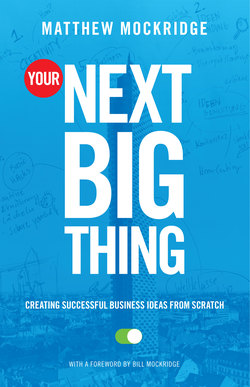Читать книгу Your Next Big Thing - Matthew Mockridge - Страница 17
На сайте Литреса книга снята с продажи.
ОглавлениеOkay, you may be thinking: “But I’m not creative at all!” An important thought before we go out on the thin ice of creativity together: Creativity is not so much a skill. It’s an attitude, and ultimately an evaluation made by the beholder. And as an evaluation, creativity comes after the creation.
An artist will throw four shades of yellow on a canvas and sell the thing for ten million dollars. Why? Because someone decided it was unbelievably creative. Which came first, the creation or that evaluation?
Let’s follow this train of thought for a moment. What would happen if we disregarded our nervousness and uncertainty about our own creativity, and only concentrated on the one element of the creative process that we can control, our action? So, in this chapter, we’ll disassemble creativity and—from now on—focus only on the nails we can sink.
The following ten thoughts about creativity are actionable and fool-proof, contrarily to whatever you might hear from art gallery small talk. Start before you’re ready! Creativity can only be confirmed after you’ve made the first brush stroke. Claim your creativity by just getting started! To believe in your gift, your talent, the artistry of your next really great idea—that is the true creativity, and that’s what will uncover your genius. Just between us: creativity is, above all, a synonym for courage. Let’s walk out onto the thin ice together! Let me help you grab hold of your courage and show the world your art—one step at a time!
1. Where Are Your Creative Ideas Coming From?
We’d made it! We (my three best friends and co-founders, Flo, David, Siamak—and I) were beaming: our entrepreneurial dream had come true! One hour before our fourth NEONSPLASH–Paint-Party® event, more than 5,000 guests lined up outside the door, waiting to be let into the sold-out concert hall. They came to dance to electronic music and get hit with neon paint balls. Something that, at the time, might have seemed unimaginable, and even offensive, became my first really successful business idea.
Our business idea worked, and it worked really well. More than 500,000 people have visited us to date in more than 60 cities throughout Europe. And they would readily agree. “The best party of my life,” is what most say after a NEONSPLASH–Paint-Party®.
I’m often asked how we got the idea. My answer is short and honest: “We didn’t come up with the idea; the idea came up to us!” Ideas come from the sum of everything you are exposed to—they are the product of your environment. Can you stay home and generate good ideas just by typing on your computer? Forget it! But go for a walk, talk to new people, read books that challenge you, and visit new places, and you won’t be able to save yourself from good ideas.
Fact: change yields progress. The average tenure at ultra-creative companies like Google is just over one year. Why? Because constant change promotes continual evolution. There’s a correlation between change and development. If the local bank down the street has been pursuing the same strategy for thirty years, this is certainly because the same heads have been sitting in meetings for thirty years. If the implementation of new ideas is related to the turnover of employees (and the new thoughts that new employees bring), then Google develops at a rate thirty times faster than the local bank. (In reality, it’s many times more.)
So, back to summer 2008—my first year at a typical U.S. university in Tampa, Florida. My buddy David and I love the new life at school (and the beach) and are realizing our version of the American Dream. We’re tens of thousands of kilometers away from home, from everything we know and understand. We are vulnerable, not always fully in control, and those are important ingredients for modesty and honesty.
Still, we don’t know our way around; we’re often lost or disoriented, and have to ask for directions. But it is specifically the things that we don’t yet know that are going to lay the foundation of our entrepreneurial success.
